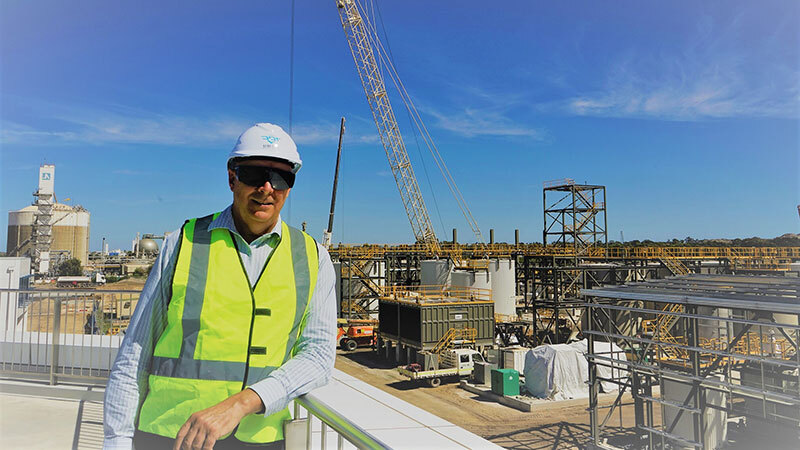With deep experience in fossil fuels and renewables Phil Thick understands challenges of energy transition
Thick has a special interest in sustainability in industrial processes, says it will play a critical part in transition to net zero
Thick is bullish on two ASX companies, which he sees as playing a critical role in Australia’s environmental future
Phil Thick has a deep understanding of the challenges facing both Australia and the world in the global energy transition.
Thick was the general manager for Tianqi Lithium Australia from 2016-2020, one of the world’s largest lithium companies, where he led the building of a billion-dollar refinery in Western Australia.
He is a non-executive director of Lithium Australia (ASX:LIT) and Patriot Lithium (ASX:PAT) and the chair of New Zealand-registered TiGa Minerals and Metals.
But the civil engineer by profession also has had an extensive career in oil and gas, having worked for Shell in Australia and overseas for 20 years and was downstream director for Shell Australia.
He also ran private company Coogee Chemicals for five years, which manufactures, stores and transports fuels and chemicals across Australia, predominantly for the mining industry.
As he works now in his current roles toward the energy solutions of the future, Thick understands the challenges of transitioning away from fossil fuels.
“I’ve been on both sides so I can understand the transition piece, which is the bit that is challenging everyone at the moment wanting to get out of fossil fuels,” Thick tells Stockhead.
“But fossil fuels are still by far the biggest energy source that we have and will continue to be probably for the next couple of decades.”
Path to net zero complex
Thick says the transition to a net zero target is complex and challenging and will take time to solve.
“As much as many people would like to see fossil fuels removed from the mix immediately that is totally impractical,” he says.
“There are multiple options to assist in the transition, of which natural gas is obviously the most talked about.”
Thick says removal and storage of carbon from fossil fuel use is improving but not fast enough.
“Renewables are critical to the net zero position, but they are not yet at a level or cost or efficiency that can replace our dependence on other fuel sources,” he says.
“The global push towards EVs is continuing to accelerate and rightly so but the carbon footprint of EV production and power generation for EVs remains a challenge.”
Thick has taken a special interest in sustainability in industrial processes, believing it will play a critical part in the transition to net zero.
“Use of waste materials to generate power and recycling of materials for reuse are both critical objectives and areas of interest for me,” he says.
“Also, effective treatment and use of by-products produced in mineral and chemical processing to create as close as possible a closed loop circuit for these plants and refineries.”
Thick is investing in two ASX companies, which he thinks will help Australia and even the world in the energy transition.
Environmental Clean Technologies (ASX:ECT)
ECT describes its technology suite as the “bridge to net zero emissions”. Its tech enables the adoption of net zero emission targets by decarbonising conventional resources to create net zero emissions energy, industrial and agricultural products.
ECT’s patented COLDry technology transforms low-grade and waste feedstock into commercially viable, in-demand products.
The products feature low, net-zero, and carbon-negative footprints, addressing the needs of hard-to-abate sectors such as agriculture, industry, and energy.
The COLDry platform supports applications for soil health products, clean hydrogen, and hydrogen carriers like methanol, in addition to producing char and advanced carbon products.
Building on the COLDry platform, ECT is developing its HydroMOR technology for low- emission steelmaking and its COHgen technology for net-zero hydrogen production.
The HydroMOR process aims to provide cost-effective, low-carbon solutions for the steelmaking industry, which accounts for approximately 8% of global CO2 emissions.
Traditionally, lignite, a soft brown coal, is unsuitable for conventional steelmaking processes.
However, ECT’s HydroMOR process uses lignite, offering a low-carbon alternative to traditional high-emission blast furnace steelmaking, which relies heavily on costly and polluting coking coal.
“I’m really interested in their technology to combine two key elements – low value fuel sources like lignite which is plentiful in places like Victoria, and waste material like biomass – to help the bridge towards net zero carbon,” Thick says.
“This process produces pellets for fuel at low temperature and pressure and low to net zero CO2.
“This has been tried for decades with gasification of coal but not with great success and these processes show a lot more potential in my view.”
He says in addition to low grade coals and biomass there are so many other waste streams
that can be used for power generation including waste timber and end of life plastics.
“We have to keep closing that loop wherever we can.”
Lithium Australia (ASX:LIT)
Thick is on the board and an investor of LIT, which fully owns Envirostream, one of the few companies in Australia recycling batteries.
Launched in 2017, Envirostream has developed safe and innovative management solutions for battery disposal, which is one of the Australian waste industry’s biggest challenges and continuing to grow.
According to its website each year, more than 300 million batteries are thrown away with ordinary household waste, meaning 8,000 tonnes end up in landfill.
Envirostream offers a range of battery collection and disposal services. The company is dedicated to ensuring that dangerous materials in batteries, such as cadmium, mercury and lead are disposed of correctly, while all useful battery waste materials like magnesium, cobalt, zinc and lithium are recycled for new ones.
Envirostream operates from its two plants in Melbourne. The first site safely collects end of life batteries and prepares these for further processing. The second site processes the lithium ion batteries recovering the valuable metals.
“They are probably doing as much as anybody else in Australia and have plans to expand fairly rapidly,” Thick says.
He says Envirostream was predominantly receiving lithium-ion batteries from smaller devices such as hand-held tools but quickly EV energy storage lithium ion batteries have started to dominate
“They’re already recycling the first EV batteries which are large, and nobody really knows but it is said the life of an EV battery is about 10 years,” he says.
“The world is facing a tidal wave of EV batteries reaching end of life in the coming years and no-one is prepared for this volume today.
“They are large, heavy, expensive and difficult to move around and recycle.”
Thick says there is a great need for efficient processes to recover and re-use as much as possible of the battery minerals involved and re-use however possible the other elements including metals and plastics.
Envirostream has the technology to deal with end-of-life EV batteries.
“They are doing it now, they are doing it successfully and on-selling the by-products and I think that will be a huge industry going into the future,” Thick says.
“The car manufacturers have a responsibility for life cycle management of their batteries.”
The ECT & LIT share price today:
At Stockhead, we tell it like it is. While Environmental Clean Technologies is a Stockhead advertiser, the company did not sponsor this article.
The post From Waste to Wealth: Phil Thick’s Strategy for Sustainable Energy Solutions appeared first on Stockhead.






















